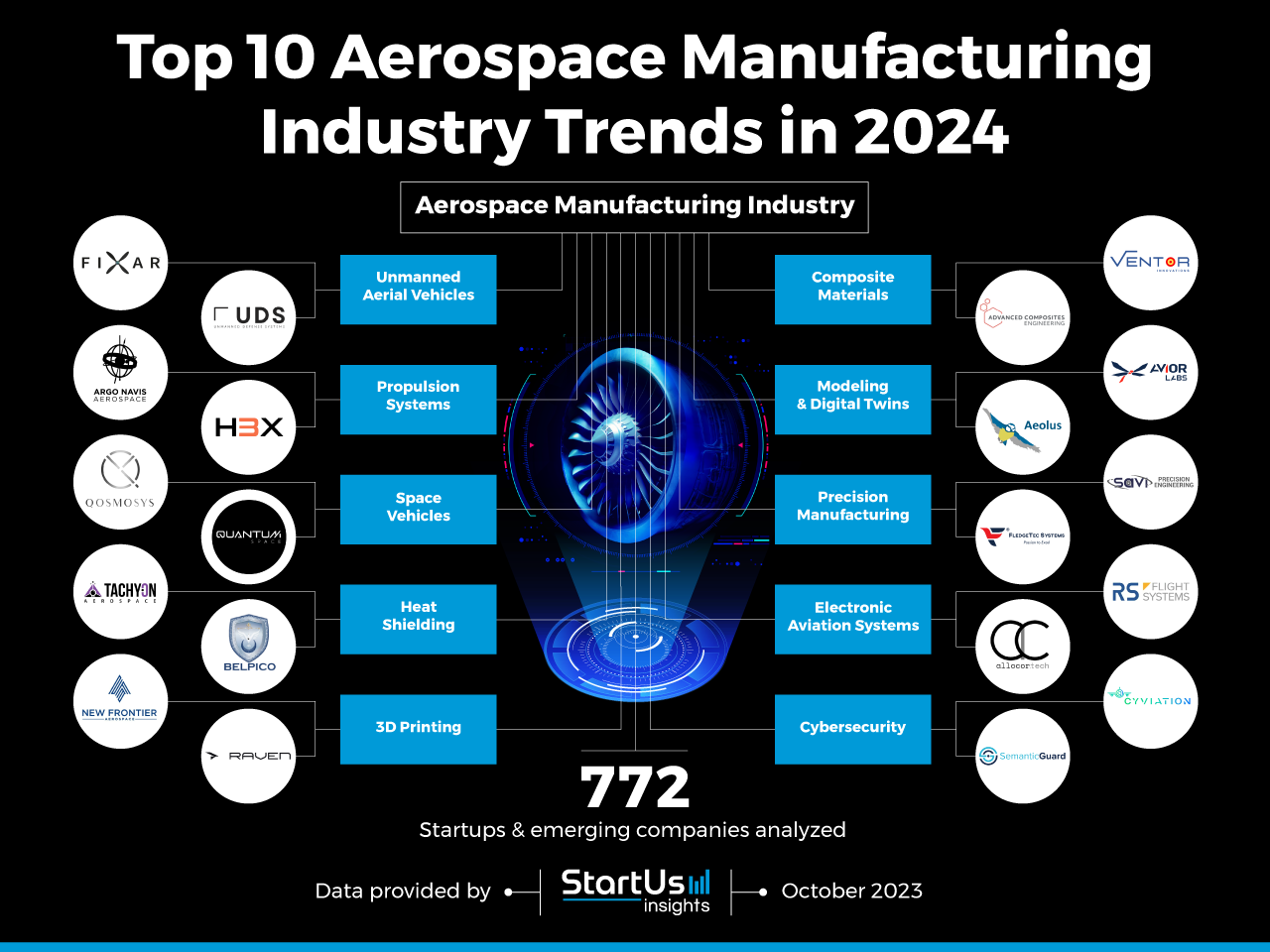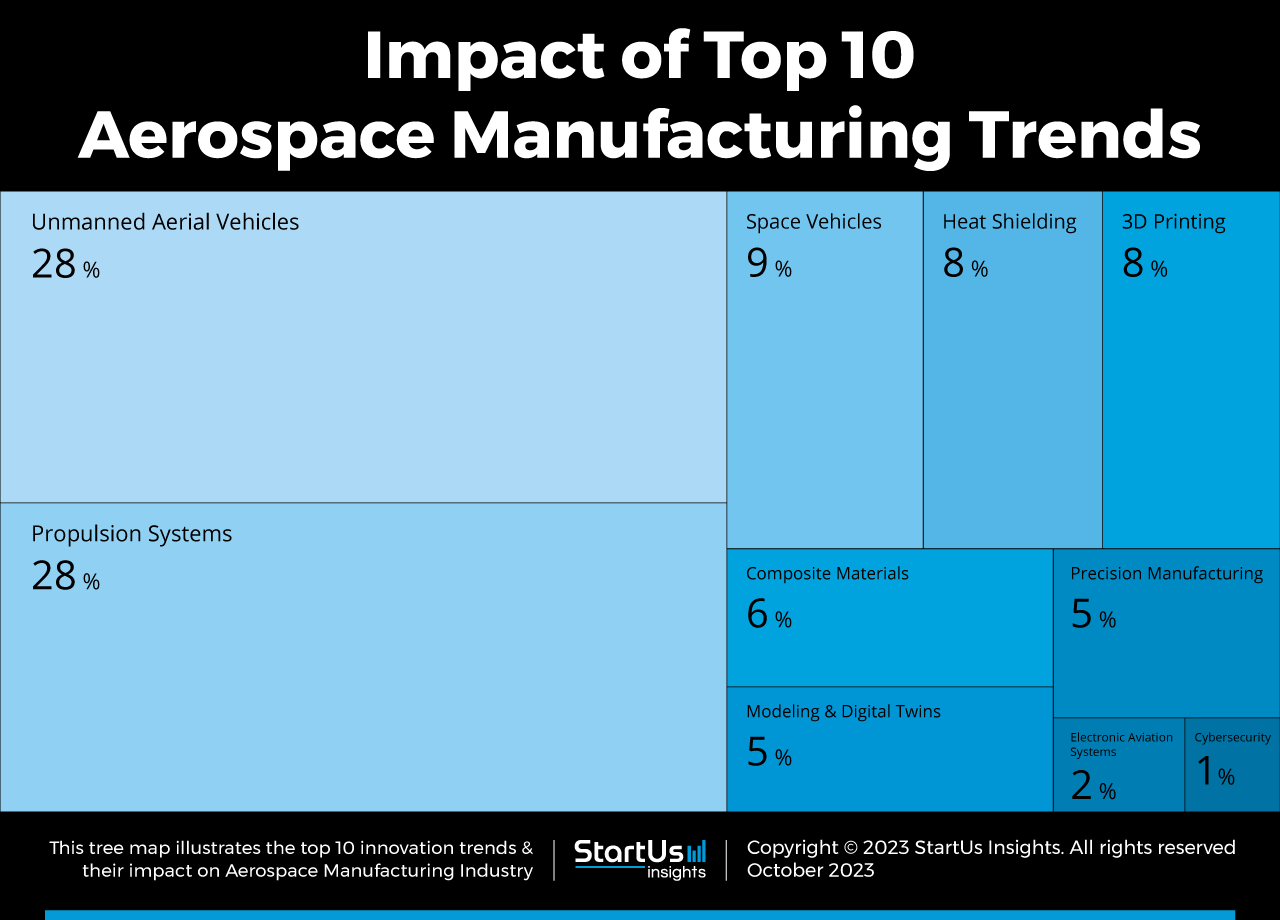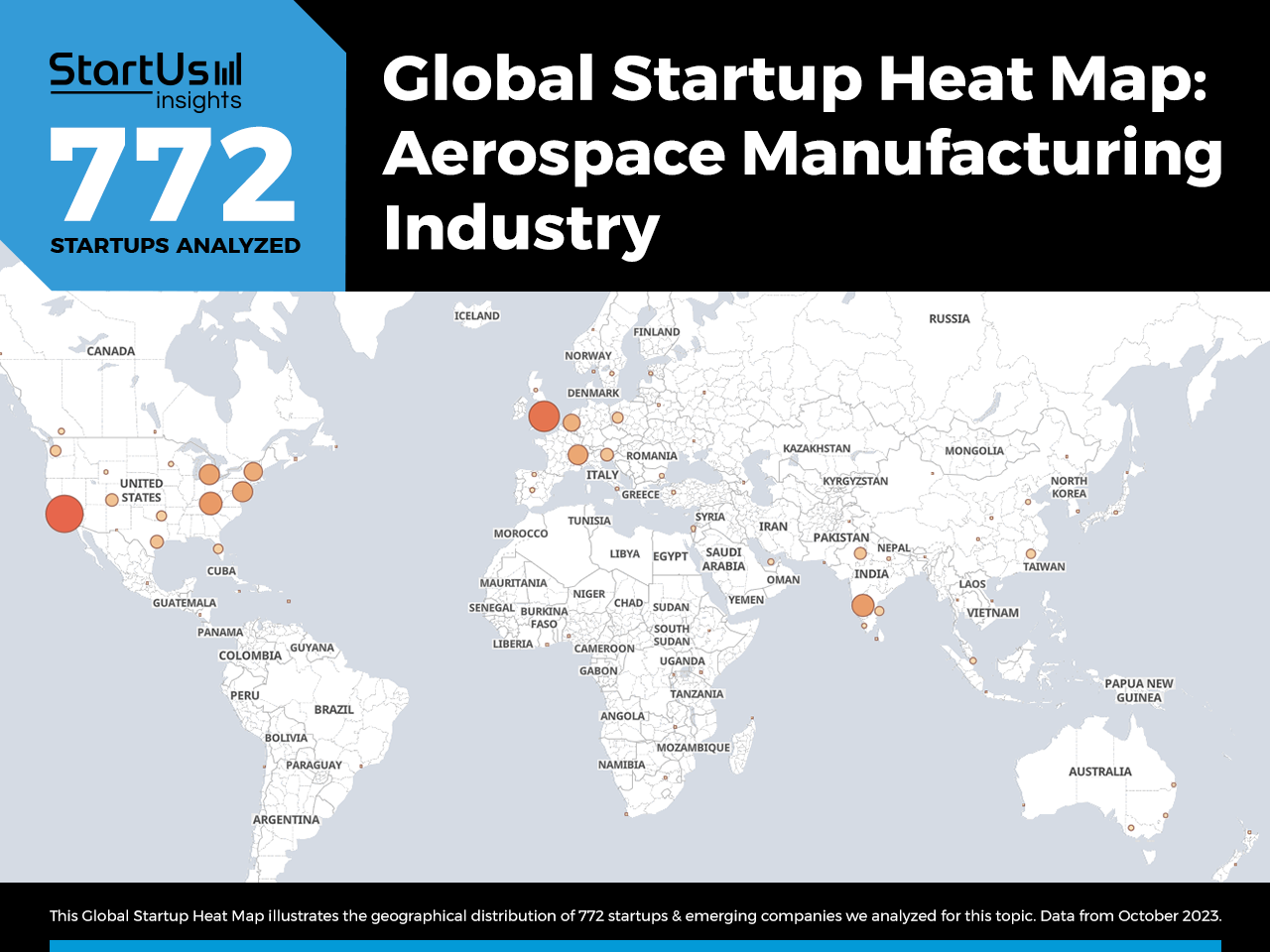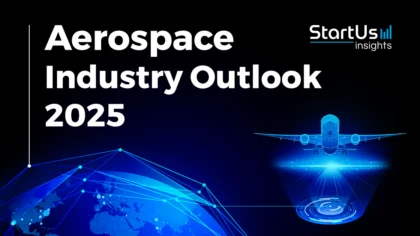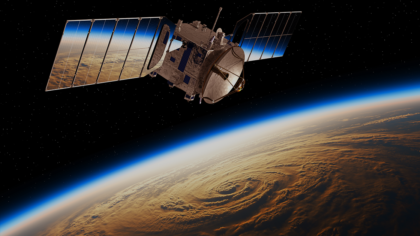Accelerate Productivity in 2025
Reignite Growth Despite the Global Slowdown
The aerospace manufacturing industry trends covered in this report aim to tackle a range of issues like supply chain disruptions and limitations in material integrity. Startups are addressing these concerns through innovative solutions spanning additive manufacturing, advanced materials, and digital twin technologies.
These technologies address the prevailing issues and also enable efficient and better methods in aircraft design and production. Moreover, these innovations benefit aircraft manufacturers by enhancing production efficiency, reducing waste, and building sustainable and fuel-efficient aircraft.
This article was last updated in August 2024.
Top Aerospace Manufacturing Trends (2025)
- Unmanned Aerial Vehicles
- Propulsion Systems
- Space Vehicles
- Heat Shielding
- 3D Printing
- Composite Materials
- Modeling & Digital Twin
- Precision Manufacturing
- Electronic Aviation Systems
- Cybersecurity
Innovation Map outlines the Top Aerospace Manufacturing Industry Trends & 20 Promising Startups
For this in-depth research on the Top 10 Aerospace Manufacturing Industry Trends and startups, we analyzed a sample of 772 global startups & scaleups. This data-driven research provides innovation intelligence that helps you improve strategic decision-making by giving you an overview of emerging technologies in the aerospace industry. In the Aerospace Manufacturing Innovation Map below, you get a comprehensive overview of the innovation trends & startups that impact your company.
These insights are derived by working with our Big Data & Artificial Intelligence-powered StartUs Insights Discovery Platform, covering 4.7M+ startups & scaleups globally. As the world’s largest resource for data on emerging companies, the SaaS platform enables you to identify relevant technologies and industry trends quickly & exhaustively.
Want to explore all Aerospace Manufacturing innovations & trends?
Tree Map reveals the Impact of the Top Trends in Aerospace Manufacturing
Based on the Aerospace Manufacturing Innovation Map, the Tree Map below illustrates the impact of the top 10 aerospace manufacturing industry trends. UAVs are increasingly popular due to advancements in drone technology, facilitating tasks like autonomous delivery and surveillance. Electric and hybrid propulsion systems are making, flights more sustainable and efficient while reusable rockets and advanced satellite systems are making space more accessible and cost-effective.
Advancements in heat shielding protect aircraft and spacecraft from atmospheric friction, allowing them to achieve greater speeds with reduced thermal damage. Further, 3D printing enables quick prototyping and intricate part creation with composite materials providing a superior strength-to-weight ratio and resulting in lighter, more robust aircraft. Modeling and digital twins provide real-time analytics, refining design, and upkeep which also facilitates more precision in manufacturing.
Moreover, electronic aviation systems are incorporating AI and sensors to improve navigation and communication. Lastly, with the rise in digital integration, robust cybersecurity is essential to protect aerospace operations from threats using advances in intrusion detection and network protection.
Global Startup Heat Map covers 772 Aerospace Manufacturing Startups & Scaleups
The Global Startup Heat Map below highlights the global distribution of the 772 exemplary startups & scaleups that we analyzed for this research. Created through the StartUs Insights Discovery Platform, the Heat Map reveals high startup activity in the US and UK, followed by India and Europe.
Below, you get to meet 20 out of these 772 promising startups & scaleups as well as the solutions they develop. These aerospace manufacturing startups are hand-picked based on criteria such as founding year, location, funding raised & more. Depending on your specific needs, your top picks might look entirely different.
Top 10 Aerospace Manufacturing Trends in 2025
1. Unmanned Aerial Vehicles
The cost of conventional aircraft is high due to large components, the need for precise and consistent quality control, and the complexities of ensuring safe and efficient assembly. Innovations in unmanned aerial vehicles (UAVs) are addressing these issues by offering cost-effective alternatives for transportation, surveillance, and combat applications.
Moreover, industrial automation and advanced manufacturing techniques provide enhanced quality control and utilize modular designs that simplify assembly and maintenance procedures while building them faster.
FIXAR Global manufactures Autonomous Commercial Drones
Latvian startup FIXAR manufactures autonomous UAVs for a range of commercial applications. Its FIXAR 007 drone is a VTOL (vertical take-off and landing) fixed-wing device suitable for tasks such as mapping, inspections, and aerial imaging. Its FIXAR 025, on the other hand, is designed for large-scale and long-range missions with a flight range of up to 150 km and a payload capacity of 10 kg.
Additionally, the drone’s full-body lift design ensures efficient resource consumption for extended flights. Both drones are equipped with proprietary software and autopilot that ensure fully autonomous operations.
Unmanned Defense Systems builds Military Aircraft Systems
Lithuanian startup Unmanned Defense Systems manufactures tactical military UAVs with a focus on modern conflict management. Its drones operate on an advanced modular system that focuses on system autonomy, flexibility, and the capability to evolve. Among its products, the Catfish Target UAV is designed to mislead enemies and protect other high-value UAVs.
Unmanned’s other UAV systems include the Partisan Reconnaissance which is silent and has a low radar signature, ensuring successful missions in military or conflict regions.
2. Propulsion Systems
Problems such as the thermal management of engines, noise pollution generated by conventional propulsion, and limitations in fuel efficiency drive innovations in building next-generation aircraft. Innovations in propulsion systems are addressing these hurdles by incorporating advanced cooling technologies, designing sound-reduction mechanisms for hypersonic flight, and integrating hybrid-electric solutions. Moreover, these innovations enhance performance, reduce environmental footprint, and generate additional operational cost savings for the aerospace industry.
Dawn Aerospace offers a Non-Toxic Propulsion System
Dawn Aerospace is a New Zealand-based startup that develops green propulsion systems for space applications. The company’s product, Dawn Aurora, utilizes non-toxic propellants to provide efficient, environmentally friendly thrust for satellites. The propulsion system integrates advanced hardware and software to ensure optimal functionality in various orbital conditions.
Designed for small to medium-sized satellites, it enhances mission capabilities while minimizing operational costs. Commercial satellite operators and governmental space agencies benefit from Dawn Aerospace’s propulsion solutions, which align with sustainability goals. Further, Dawn Aurora‘s modular design allows for easy integration into existing satellite platforms. This seamless adaptation accelerates deployment and maximizes operational efficiency.
H3X Technologies develops Integrated Motor Drives
US-based startup H3X advances electric aircraft propulsion systems through integrated motor drivers. The startup’s HPDM-250 is an integrated motor drive that merges the electric motor, inverter, and gearbox into one unit.
It features electromagnetic design optimization, high thermal conductivity stator winding, and a cooling jacket that cools power electronics and stators with a single 3D-printed aluminum jacket. The HPDM-250 is designed for high-performance and mass-sensitive applications including electric aircraft, eVTOLs, and other aerospace applications.
3. Space Vehicles
Aerospace manufacturing, when focused on space vehicles, confronts unique challenges such as the extreme conditions of space, the need for prolonged vehicle longevity, and the intricacies of atmospheric re-entry. Startups are overcoming these challenges through innovations in materials that are resistant to space radiation, and designing modular spacecraft components for in-orbit repairs and upgrades.
Besides this, the engineering of advanced heat shields and aerodynamic structures ensures safe escape and controlled re-entries of the earth’s atmosphere. Additionally, these innovations also make transporting cargo into space more economical and enable the growing space industry to launch more vehicles into orbit.
Qosmosys manufactures Lunar Exploration Spacecraft
Singapore-based startup Qosmosys advances space exploration through its flagship spacecraft, ZeusX which consists of multiple modules. These modules include a service module (QSM), a moon lander (QML), and a lunar integrated bulk extraction rover (LIBER) which provide versatility in lunar operations.
With a substantial size and payload capacity, it efficiently transports scientific instruments and supports commercial applications. Moreover, ZeusX is compatible with various launch vehicles amplifying its potential for global lunar missions.
Quantum Space advances Modular Spacecraft
US-based startup Quantum Space specializes in advanced space transportation and logistics solutions. Its Ranger OTV is a transportation and logistics vehicle tailored for the challenging geosynchronous orbit (GEO) and geostationary orbit (xGEO) environments. The Ranger OTV also transports a variety of rideshare payloads, ranging from CubeSats to larger orbital transfer vehicles.
The vehicle is also adept at delivering, deploying, relocating, and hosting satellites and payloads, especially in civilian spaces. Quantum Spaces’ solution provides opportunities for hosted payloads and rideshare spacecraft, promoting frequent launches for the aerospace industry.
4. Heat Shielding
One of the main challenges in the aerospace industry is ensuring the safety of spacecraft and aircraft during high-speed flight, re-entries, and exposure to extreme temperatures. The intense heat generated during these phases can compromise the structural integrity of the vehicle and endanger the mission.
Therefore, innovations in heat shielding such as advanced materials like ablative composites dissipate heat effectively by employing multi-layer insulation systems. These systems offer enhanced thermal protection while other innovations like adaptive shielding technologies adjust to varying thermal conditions, ensuring optimal protection and extending the lifespan of aerospace vehicles.
Tachyon Aerospace develops Smart Skin Technology
Canadian startup Tachyon Aerospace develops smart skin technology that measures airflow, temperature, hull strain, and magnetic field strengths that assist in the positioning of plasma. This system also contributes to radiation shielding, heat buildup mitigation, and aerodynamic drag force reduction.
The startup’s innovations extend to the TAV-1 Space Craft, designed to drastically reduce the cost of transporting cargo into orbit. This craft incorporates advanced features like on-board fuel production and radiation shielding. Further, Tachyon Aerospace’s modular spacecraft technologies are advancing sustainable and efficient space exploration.
Belpico offers Carbon-Carbon (CC) Composites
Turkish startup Belpico specializes in carbon and carbon (CC) composites that are designed to withstand ultrahigh temperatures and mechanical stresses. It comprises a fibrous carbon substrate, a carbonaceous matrix, and a protective coating that maintains its mechanical properties even in extreme conditions.
The coating ensures friction performance and wear resistance, allowing the composite to endure tremendous temperatures. This composite’s properties can be tailored to fit specific applications through weaving patterns and lay-up procedures. Belpico’s advanced materials enable the production of aerospace equipment that is more durable, efficient, and have longer lifespans.
5. 3D Printing
Traditional aerospace manufacturing methods incur high costs and long production lead times due to the requirement of components that are lightweight, intricate in design, and complex to produce. However, innovations in 3D printing methods like fused deposition modeling (FDM) and electron beam melting (EBM) are enabling the rapid fabrication of complex geometries. This significantly reduces the time from design to production and also serves as a cost-effective solution to minimize waste and streamline aerospace supply chains.
New Frontier Aerospace specializes in 3D-printed Engines
New Frontier Aerospace is a US-based startup that develops a 3D-printed, full-flow staged combustion engine that is designed for optimal efficiency. The Mjölnir engine offers high thrust-to-weight ratios, making it ideal for hypersonic aircraft, upper stages, maneuvering spacecraft, and planetary landers.
The engine also features deep throttling, easy start/stop, and two-commodity operations making Mjölnir highly operable and reusable. Further, the engine also utilizes clean liquid natural gas (LNG) fuel to promote a negative carbon footprint in the aerospace industry.
Raven Space Systems creates 3D-printed Re-entry Capsules
US-based startup Raven Space Systems advances on-demand space cargo return through 3D-printed reentry capsules. The startup’s autonomous reentry capsule factory manufactures capsule structures and heat shields in a short time while significantly reducing defects. Besides this, its manufacturing process significantly reduces production and development costs and uses no fixed tooling which simplifies supply chains.
Moreover, Raven’s in-situ curing direct ink write technology facilitates the 3D printing of high-performance thermoset composites. Raven Space System’s production method bolsters the low earth orbit (LEO) economy through high-cadence returns and makes payload returns from space more affordable and accessible.
6. Composite Materials
Advanced aircraft development is limited by component weight constraints, susceptibility to metal corrosion, and demand for materials that withstand high stress and temperature variations. To overcome these, startups are developing composite materials such as fiber-reinforced polymers and ceramic matrix composites.
These materials offer a superior strength-to-weight ratio compared to traditional metals. For example, these advanced composites resist corrosion, reduce overall aircraft weight, and enhance fuel efficiency, all while maintaining structural integrity under diverse operating conditions. Such composite materials enable aerospace industry designers and manufacturers to create more efficient and durable aerospace vehicles.
Ventor Innovations manufactures Composite UAV Components
Ventor Innovations is a Spanish startup that advances aerospace technologies using composite materials. Its composite-based reflective antennas and surfaces utilize materials like carbon fiber, metals, and graphene for electrical conductivity and radomes that are designed to be permeable to specific radiation frequencies.
Further, it produces components with varying shapes and geometries for applications demanding high strength and low weight, particularly for unmanned vehicles (UAV) or drones. Besides providing composite materials and components, Ventor Innovations also manufactures UAVs like the V-RAPTOR and V-PROTON to protect wind power generation assets from birds.
Advanced Composites Engineering creates Composite Tubes
Advanced Composites Engineering is a UK-based startup that manufactures composite tubes from materials like carbon fiber, glass fiber, and Kevlar. The startup uses a mandrel wrapping technique, to ensure accurate fiber placement, balancing strength, weight, and flexibility. A significant portion of its tubes undergoes a male molding process or roll wrap which is optimal for thin-walled composite tubing.
Besides this, the startup also produces carbon sleeves for digital motors that hold them in place at extremely high rotational speeds. Advanced Composites Engineering provides tubes that offer balance in strength, flexibility, and weight to components, which is essential in aerospace applications.
7. Modeling & Digital Twin
The design and manufacturing of aircraft involve predicting component wear and tear, optimizing maintenance schedules, managing real-time monitoring of systems for safety, and more. To optimize these time-consuming and labor-intensive steps, innovations in modeling and digital twins create virtual replicas of physical aerospace assets.
These digital twins allow for real-time virtual simulations of aircraft in a range of conditions to enable asset monitoring, predictive analytics, and simulation-based testing. This not only facilitates proactive maintenance and reduces unplanned downtimes but also aids in refining designs and operational strategies based on real-world performance data.
Avior Labs develops a Universal Simulation Environment
South African startup Avior Labs develops a simulated digital environment tool called Universal Simulation Environment (USE) based on C++. The tool features modularity, networked capabilities, and high-performance desktop simulations for both faster-than-realtime and real-time applications.
Additionally, it specializes in aircraft system identification, using experimental data to create mathematical flight vehicle models as well as techniques like fuzzy logic and neural networks. Additionally, its prototyping facility enables the creation of molds and composite parts along with the testing of new designs for aerospace manufacturing.
Aeolus Aero specializes in Aerodynamic Analysis and Shape Optimization
Aeolus ASP is a Swiss startup that offers a tool for modeling fixed-wing aircraft configurations and propeller blades that emphasizes easy adjustment of parameters. The software boosts the conceptual and preliminary design phases, allowing for rapid evaluation of design alternatives.
Aeolus ASP also incorporates a three-dimensional panel method kernel, blending high-order and low-order methods for optimal computational efficiency. Besides this, built-in shape optimization identifies design enhancements, streamlining the search for optimal solutions. Additionally, its post-processing features include 3D surface pressure plots, surface flow vectors, flight physics properties, and more. Aeolus Aero’s tool enables aircraft designers to simplify and improve the UAV design process.
8. Precision Manufacturing
Aerospace manufacturing requires producing components with minute tolerances and consistent repeatability in production cycles, while minimizing defects in high-value parts. Precision manufacturing is addressing these by employing advanced machining techniques, such as ultra-precision milling and laser micro-machining.
These solutions ensure that components are crafted to the tightest specifications. Additionally, the integration of real-time monitoring systems and feedback loops in the manufacturing process ensures that deviations are instantly detected and corrected, leading to improvements in component reliability and waste reduction in the aerospace sector.
SAVI Precision Engineering provides Precision Metal Forming
SAVI Precision Engineering is a Mexican startup that specializes in precision metal forming for the aerospace industry. The startup offers a range of forming technology tailored to specific component needs and produces complex honeycomb assemblies, integrating sheet metal fabrication with certified supplier management.
SAVI also creates cooling and impingement inserts using 3D image qualification for process repeatability and intricate combustor assemblies. Besides this, its manufacturing process works with steel and nickel alloys which increases their range of capabilities in precision component production.
FledgeTec Systems manufactures Mission Critical System Components
Indian startup FledgeTec develops advanced components for mission-critical systems in aerospace and other sectors. The startup offers custom-built product design, development, and modification, focusing on mechanical, electronics, and embedded software components. The startup uses precision machining with a range of CNC machines from two- to four-axis with specialized fixture designs.
Additionally, the fixtures are optimized for maximum tool utilization with better cycle time, surface finish, accuracy, and repeatability. FledgeTec’s other capabilities span sheet metal fabrication, PLC-based automation, sourcing of engineering parts, design for testability, and manufacturing design optimization.
9. Electronic Aviation Systems
Aerospace electronics are complex due to the need for integration and reliability of avionic systems, real-time data processing in flight operations, and ensuring interference-free communication. For this reason, startups are developing advanced integrated modular avionics which streamline system architectures and enhance redundancy.
Further, sophisticated data buses and high-speed processors ensure rapid data exchange and processing, while advanced shielding techniques and frequency-hopping communication protocols mitigate electronic interference. Such innovations in electronic aviation systems ensure safer and more efficient flight operations both from the ground and onboard the aircraft.
RS Flight Systems provides Engine Management Units
German startup RS Flight Systems develops engine management units (EMU) for BRP Rotax engines that also function in full redundancy. The startup’s EMU 9xiS connects directly to the CANaerospace network buses of the Rotax engine control unit. An additional feature, the Single Lever Power Control, offers real-time in-flight propeller pitch adjustment, enhancing aircraft performance.
The startup also specializes in customized avionic development, encompassing a range of products from fly-by-wire control sticks to modular flight test instrumentation devices. Besides this, RS Flight System’s modular flight test instrumentation, built on the CANaerospace system, is easy to install in any aircraft to collect data.
allocortech manufactures Safety-Critical Systems
US-based startup allocortech specializes in safety-critical systems for vehicles across air, land, and sea. The startup’s products include the COMET FTS, a radio-linked flight termination system with dual redundant processing and redundant termination circuits.
The HORNET is a miniature air data and heading reference system (ADAHRS) that provides real-time sensor data, processing, and reporting. Besides this, its LOHNER smart battery is a high-density LiPo battery with high-availability standby power to provide continuous power to mission-critical aircraft systems.
10. Cybersecurity
Increasing digitalization and the potential of cyber-based threats are creating risks in safeguarding sensitive flight data, protecting integrated avionic systems, and ensuring the security of communication channels. Innovations in cybersecurity are addressing these vulnerabilities by implementing advanced encryption protocols and developing intrusion detection systems tailored for aerospace applications.
Besides this, secure boot mechanisms ensure that only authenticated software runs on airborne systems. These protect proprietary aerospace designs and data and also ensure that aircraft and onboard systems remain resilient against cyber-attacks.
Cyviation promotes Secure Cockpit Communication
Cyviation is an Israel-based startup that enhances cybersecurity for commercial airlines and private jets. The startup offers a fleet cyber risk assessment, providing continuous, non-intrusive evaluations of aircraft vulnerabilities with threat impact analysis and mitigation recommendations.
Cyviation’s airborne cybersecurity solution also features an Intrusion Detection System (IDS) for cockpit communication and networks, ensuring real-time detection capabilities for avionics ARINC-429 networks. The Cyber Incident Management module enables airlines to manage cyber incidents, offering fleet-wide broadcast alerting capabilities and making aircraft operations safe and secure.
SemanticGuard advances Zero Trust Application Security
SemanticGuard is a US-based startup that delivers advanced cybersecurity solutions, emphasizing zero-trust application security. Its patented GUARDx solution offers built-in application security, adopting an inside-out approach enhanced by six intelligent behavioral analytics modules.
Additionally, its modules like the Consistency Module and Firewall Module offer protection against man-in-the-middle attacks and dynamic threat vectors, respectively. Its features also include behavioral analysis through continuous monitoring of software processes and network location analysis to protect against spoofing. By targeting applications and embedded components, SemanticGuard ensures that applications close any potential vulnerabilities in aerospace systems.
Discover all Aerospace Manufacturing Industry Trends & Startups
The future of aerospace sees AR and VR tools being integrated into training and maintenance procedures, offering immersive learning experiences and simplifying complex tasks. Further, adaptive wing technologies allow aircraft to better adjust wing shapes and protective capabilities in real time, optimizing aerodynamics, fuel efficiency, and structural integrity. Advances in smart swarm technology are enabling larger numbers of UAVs to execute more complex and large-scale group operations.
The aerospace manufacturing industry trends and startups outlined in this report only scratch the surface of trends that we identified during our data-driven innovation & startup scouting process. Identifying new opportunities & emerging technologies to implement into your business goes a long way in gaining a competitive advantage.


